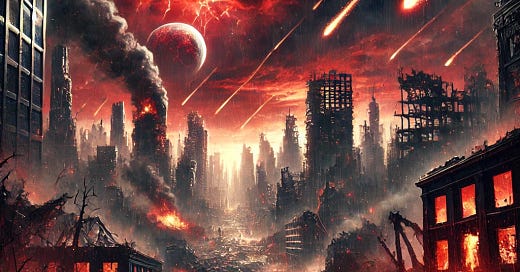Religious extremism has never passed quietly through history. It marches, conquers, and leaves ruin in its path. In the United States today, we are watching the rise of a movement that echoes the worst instincts of theocratic rule — emboldened by political power, driven by Christian nationalism, and led by figures like Donald Trump, who, while not personally devout, knows how to harness religious fervor.
Evangelical leaders, once on the fringe of national politics, now shape court decisions, public education, and law. The line between church and state, once a cornerstone of American democracy, is under siege.
History clearly shows what happens when religious ideology is fused with state power. From the Crusades to the Inquisition, from Puritan New England to the Salem witch trials, theocratic rule breeds repression and violence. It always needs a scapegoat — non-believers, heretics, outsiders. Today, those targets include LGBTQ+ individuals, women seeking control over their bodies, immigrants who don’t conform, and secular citizens who refuse imposed morality.
Christian nationalism is not new, but it’s gaining momentum. The January 6th insurrection laid it bare: amid MAGA hats and Confederate flags were crosses and signs declaring “Jesus is my savior, Trump is my president.” This wasn’t a political protest — it was religious warfare disguised as patriotism. These believers no longer separate divine will from political agenda. Their language is apocalyptic, and their mission is absolute. If you’re not with them, you’re against God.
When religion controls governance, pluralism dies. In 1930s Germany, many Protestant churches aligned with Hitler under “positive Christianity,” purging Jewish influence and sanctifying fascism. It didn’t start in death camps — it began in pulpits, with sermons preaching divine destiny and holy enemies.
The U.S. Constitution was built to prevent this. The First Amendment protects freedom of belief by preventing the state from favoring any religion. But that wall is crumbling. A Supreme Court shaped by Evangelical interests is increasingly interpreting the Establishment Clause not as a shield for citizens but as a defense for religious institutions. The judiciary is shifting from protecting us from religion to protecting religion from us.
The push for Christian rule is not symbolic — it’s strategic. It seeks to rewrite curricula to reflect Biblical doctrine, defund public programs that don’t align with conservative faith, and legislate morality. When Texas bans abortion, even in cases of rape or incest, it’s not secular governance — it’s religious punishment. When Florida bans books with LGBTQ+ themes, it’s not about protecting children — it’s about criminalizing identity.
Evangelical ideology even extends to environmental destruction. Many deny climate change outright, claiming only God can alter the Earth’s systems. This belief blocks meaningful climate action and enables unchecked damage, as rising seas and deadly heatwaves are brushed aside as part of “God’s plan.”
This is not uniquely American. There’s a global playbook for theocratic control. Iran’s 1979 revolution replaced secular government with religious tyranny. The Taliban enforces brutality cloaked in scripture. In every theocracy, belief is not about truth but obedience — control over thought, identity, and life.
Some downplay the threat. They say Trump is a grifter, not a messiah, and evangelicals are a declining minority. Maybe. But desperate movements fight hardest when cornered. Christian nationalists believe their time is short and that fear makes them dangerous. They see compromise as surrender and their cause as a holy war.
What makes this moment uniquely perilous is the apocalyptic belief at its core. The doctrine of the Second Coming — Jesus returning in glory to destroy the wicked and save the righteous — isn’t just prophecy. For many, it’s a political goal. They’re not avoiding the end of the world — they’re trying to trigger it. If nuclear war helps bring about Christ’s return, so be it. Trump, to them, isn’t just a president — he’s a vessel, a flawed messiah to fulfill divine plans.
That’s not metaphorical. It has real-world implications. If world-ending violence is seen as salvation, then diplomacy is seen as weakness, and destruction becomes destiny. When people who believe this are in proximity to nuclear power, the danger is not just national — it’s global.
This isn’t hypothetical. If allowed to progress, we will see laws criminalizing dissent, surveillance of the “ungodly,” educational purges, and normalized violence against non-believers. The U.S., once a haven for religious freedom, could become a machine for religious persecution.
And yes, people will die. Women will die from botched abortions and denied care. Trans youth will die from suicide and hate-fueled violence. Non-Christians and atheists will be harassed, jailed, and even killed. Margaret Atwood didn’t invent The Handmaid’s Tale — she stitched it together from historical fact. The danger isn’t fiction. It’s precedent.
The question now is whether we recognize it in time. Secularism isn’t the absence of belief — it’s the presence of freedom. A country that allows for all beliefs, including none, is the only place where true faith can exist without coercion. We’re at a crossroads, and the storm is already forming. This is not just a political struggle — it’s an existential one.
To stop it, outrage isn’t enough. We need action at the ballot box, in school board meetings, in courtrooms, and in the streets. We need to march, speak, vote, and resist. We must stop treating Christian nationalism as just another political stance. It’s not. It’s a threat — not to faith, but to freedom, to democracy, and to life itself. And if we don’t push back now, we’ll wake up in a country where law becomes scripture, morality becomes a mandate, and nonbelief becomes a crime.
By then, however, it may be too late.
“Do it in the name of heaven / You can justify it in the end.”
— Theme from Billy Jack (1971), written by Coven
Professor Mike teaches justice studies and global security, with a focus on contemporary threats and crisis leadership.





Great article, and absolutely terrifying. People underestimate how scary American Christian nationalists are and the insanity they believe in.